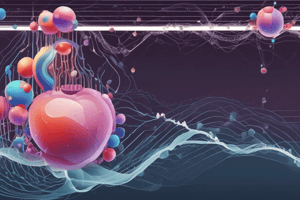Podcast
Questions and Answers
Which organic compounds are related to fatty acids and are insoluble in water but soluble in fat solvents?
Which organic compounds are related to fatty acids and are insoluble in water but soluble in fat solvents?
- Carbohydrates
- Nucleic acids
- Proteins
- Lipids (correct)
What are the esters of fatty acids with glycerol called?
What are the esters of fatty acids with glycerol called?
- Waxes
- Triglycerides (correct)
- Sulpholipids
- Phospholipids
Which lipids are formed of fatty acids and alcohol?
Which lipids are formed of fatty acids and alcohol?
- Sulpholipids
- Waxes (correct)
- Glycolipids
- Phospholipids
What are the substances derived from simple lipids and compound lipids by hydrolysis?
What are the substances derived from simple lipids and compound lipids by hydrolysis?
Which type of lipid is formed of glycerol and 3 fatty acids, making it a triester?
Which type of lipid is formed of glycerol and 3 fatty acids, making it a triester?
Which type of lipids are esters of fatty acids with glycerol, forming triesters?
Which type of lipids are esters of fatty acids with glycerol, forming triesters?
What category of lipids includes compounds formed of simple lipids (glycerol & fatty acids) and other non-lipid parts?
What category of lipids includes compounds formed of simple lipids (glycerol & fatty acids) and other non-lipid parts?
Which type of lipids is formed from lipid and carbohydrate components?
Which type of lipids is formed from lipid and carbohydrate components?
What substances are derived from simple lipids and compound lipids by hydrolysis?
What substances are derived from simple lipids and compound lipids by hydrolysis?
Which category of lipids includes the combination of lipid and protein components?
Which category of lipids includes the combination of lipid and protein components?
What are lipids?
What are lipids?
What are simple lipids?
What are simple lipids?
What are compound lipids formed of?
What are compound lipids formed of?
What are derived lipids?
What are derived lipids?
What are fats and oils?
What are fats and oils?
Flashcards are hidden until you start studying
Study Notes
Lipid Classification and Characteristics
- Waxes are organic compounds related to fatty acids, insoluble in water, but soluble in fat solvents.
- Esters of fatty acids with glycerol are called triglycerides.
Structure and Formation of Lipids
- Triglycerides are formed of glycerol and 3 fatty acids, making them triesters.
- Simple lipids are formed of glycerol and fatty acids.
- Compound lipids are formed of simple lipids and other non-lipid parts.
Types of Lipids
- Lipids are a category of biomolecules that include fats, oils, waxes, and related compounds.
- Simple lipids are composed of glycerol and fatty acids.
- Compound lipids are formed of simple lipids and other non-lipid parts, such as phospholipids (lipid and phosphate groups) and glycolipids (lipid and carbohydrate components).
- Derived lipids are substances derived from simple lipids and compound lipids by hydrolysis, including fatty acids and glycerol.
- Lipo-proteins are a category of lipids that combine lipid and protein components.
Fats and Oils
- Fats and oils are types of triglycerides that differ in their melting points, with fats being solid at room temperature and oils being liquid.
Studying That Suits You
Use AI to generate personalized quizzes and flashcards to suit your learning preferences.




